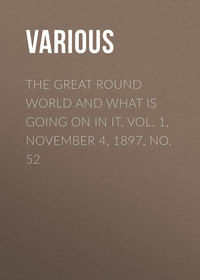Kitabı oku: «The Great Round World And What Is Going On In It, Vol. 1, November 4, 1897, No. 52», sayfa 6
LETTERS FROM OUR YOUNG FRIENDS
Editor Great Round World.
Dear Sir: Can you tell me more about the map-holder mentioned in No. 47?
W.J.B.
Dear Sir:
If you refer to the map-holder for bicycles, we would suggest that you apply to A.G. Spalding & Co., Broadway, New York.
Editor.
Dear Editor:
Will you please explain in the next issue of The Great Round World who are eligible to seats in the House of Lords and in the House of Commons? By thus doing you will greatly oblige one who is very much interested in your paper.
Respectfully yours,N.R.Morristown, N.J.
Dear Friend:
The House of Peers (or House of Lords) is composed of all the peers of the United Kingdom, the representative Scottish peers, the Irish representative peers, and the lords spiritual.
A peer is the holder of one of the five degrees of nobility,—duke, marquis, earl, viscount, or baron. These men have their seats in the House of Lords by right of birth, and take possession of them when they come of age.
The House of Peers takes its origin from the body of lords and barons who were summoned to the king's councils in olden times. Besides the peers who sit in the House of Lords by right, and who are distinguished as the lords temporal, there are twenty-six other lords who also form a part of this body, and who are known as the lords spiritual. These are the two English archbishops and twenty-four bishops.
The House of Commons is composed entirely of men who are elected by the vote of the people.
There are no restrictions whatever of birth, education, or religion. Any freeman who is elected can sit in the House. At one time an endeavor was made to exclude a man who had been elected because he refused to take the oath which is administered to all members of Parliament before they can take their seats. This was Charles Bradlaugh. He said he did not believe in an oath, but offered to affirm, or give his word instead. The House of Commons refused to accept this, and Mr. Bradlaugh was not allowed to take his seat. He afterward stated that he was willing to take the oath as a matter of form, but this was again objected to. For six years he struggled for his seat, and at last was allowed to take it, after going through the form of the oath.
A cobbler has sat in the House of Commons and helped make laws for the people, and the members of Parliament are of all ranks and ages.
In England, however, men of fortune and family take more interest in the affairs of the nation than they do with us, and the majority of the members of the House of Commons are wealthy land-owners, baronets, and knights, who have large interests at stake, and young men of good family who have been educated with the express idea of going into Parliament as soon as they were able to find an opening.
Editor.
Dear Editor:
I am one of your subscribers, and think The Great Round World a very interesting little paper. Do you think the man that went up in the balloon will succeed in finding the North Pole? I hope he will, and when he comes back give us a good history of it. And do you think that Cuba will get its freedom? I hope it will.
Yours truly,Laura G.New Philadelphia Pa.
Dear Laura:
Great fears are entertained that Professor Andrée has fallen a victim to his love for science, and is one more of the unfortunate men who have lost their lives in their search for the Pole.
In regard to Cuba—unless Spain really gives the Cubans liberal home rule that they can be happy under, they will certainly fight until they are free.
Editor.
We have received a batch of delightful letters from a school in Foxboro, Mass. We take great pleasure in printing the three following.
Editor.
Dear Editor:
Your paper came this week. As we read the notes I thought they were quite interesting. I should like to see one of those meteorites you told us about. I shall be very glad when your next paper comes, so I can read about Lieutenant Peary. The school is going to write to you and tell you how we liked your paper.
Yours truly,C. Irene B.Foxboro, Mass.
Dear Editor:
We received our paper this morning. We have only read two stories, but we think we shall like it. Our teacher read us about Lieutenant Peary, and about the meteorites he got from Greenland, and about the Tennessee bicycle. Each one in the school wrote a letter. We are going to select the best ones and send them to you.
Yours truly,Ralph E.Foxboro, Mass.
Dear Editor:
We received our paper to-day. I think we shall like The Great Round World very much. Our teacher read about the meteorites and the bicycles. Each one of us is writing a letter.
Yours truly,Harwood W.
P.S.—I have hurt my right fingers and can't write very well, but am learning to use my left hand.
Foxboro, Mass.
Every one ought to learn to write with their left hand. In England boys and girls are taught to write with both hands. There is a book published explaining the method.
Editor.
Dear Editor:
Can you give me further information relative to condensed food described on page 1267 of The Great Round World? What the probable cost will be; where can it be obtained; how soon before it can be bought; and any other facts you may know relative thereto, and greatly oblige,
Yours truly, E.A.H.
Dear Sir:
For further information about the condensed food, we would suggest that you address the New York Condensed Food Co., New York.
Editor.
